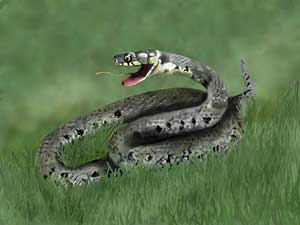|
|
|
|
SPECIES SPOTLIGHT
on

Natrix natrix
| A.K.A. |
Grass Snake; Water Snake; Ringed Snake
|
| DESCRIPTION COLORATION |
Features include: Head distinctly set off from body; Large eyes, round pupils. Coloration = gray, olive, brown, or black with dark crossbars and spots on it's back and sides. A "collar" of white, yellow, or orange is usually present.
|
| SIZE |
2-6 ½ feet in length.
|
| HOME |
Northwestern Africa, Europe, western Asia. This snake is one of the very few herps. to be found living within the Arctic Circle and also at altitudes of over 7,000 feet.
|
| HABITAT |
Damp places, marshes, swamps, meadows, river banks, streams, canals, and ponds.
|
| LIFESTYLE |
Diurnal - most of their time is spent basking; Aquatic and terrestrial; During the winter, these snakes hibernate (often times, in groups) in burrows, hollow logs, or living trees.
|
| PREDATORS |
Badgers, hedgehogs, and large birds.
|
| DEFENSES |
The defensive tricks of Natrix natrix include: inflating itself with air, hissing, biting, emitting a foul smelling liquid from glands on it's tail, and playing dead.
|
| FOOD |
Hatchlings eat worms; Adults prefer to frogs, toads, salamanders,fish. These snakes have also been known to occasionally eat mice and small birds.
|
|
HUNTING TECHNIQUES
|
This animal has the ability to hunt both in the water and on land.
|
| BREEDING |
Mating takes place in April and May. Up to 35 eggs are laid in June or July. The eggs may be laid in hollow logs, haystacks, compost heaps, or manure piles. Several females may lay their eggs in the same nest. The eggs will hatch in 6-10 weeks after they are laid.
|
| IN THE WILD |
Natrix natrix
is not yet an endangered species but it is quickly losing much of it's
habitat. It is currently protected in England.
|
|
IN CAPTIVITY
|
Grass Snakes are
considered easy to keep. The survival necessities of Natrix natrix are
elementary to maintain in captivity:
|
| SPECIAL CONCERNS |
Grass snakes are often killed because they are mistaken for Adders.
|
| INTERESTING FACTS |
In the past, many people mistakenly believed that Grass Snakes drank milk from cows.
|
For more information, visit these other web sites: